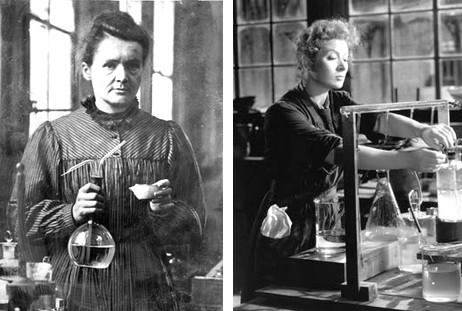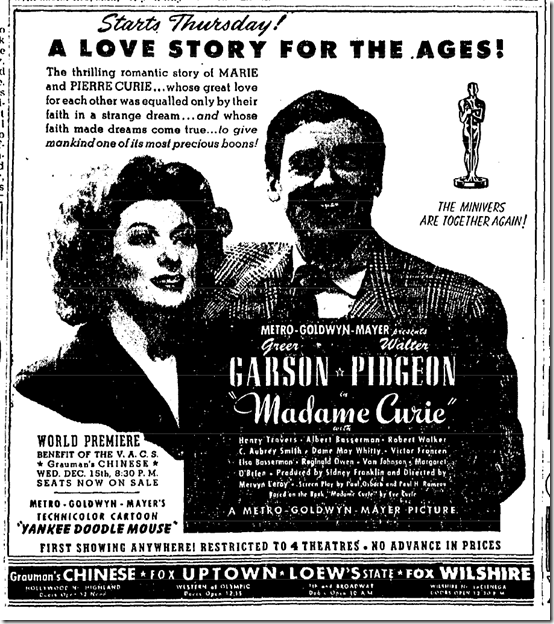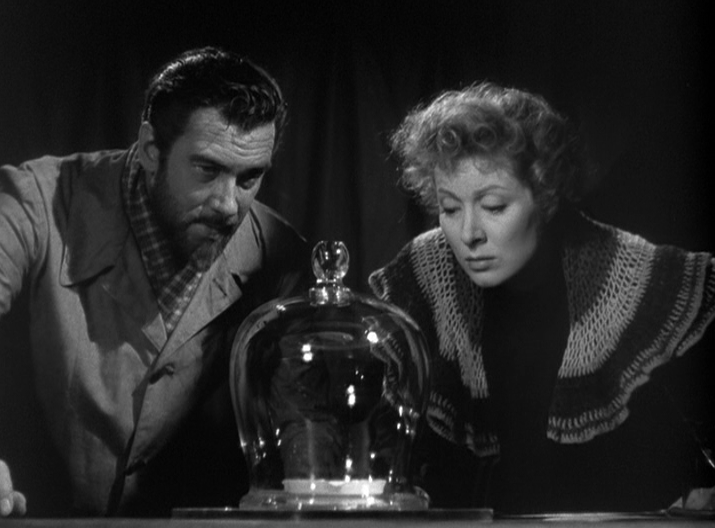Women's History Month: Greer Garson as Marie Curie
 Monday, March 17, 2014 at 3:00PM
Monday, March 17, 2014 at 3:00PM Our celebration of Women's History Month continues with abstew's look at English Rose Greer Garson in a nearly-forgotten classic about one of the most important women in science.

Marie Curie
Born: She was born Maria Sklodowska on November 7, 1867 in Warsaw, Poland. She was the youngest of five children and her father was a professor in the fields Marie would later study, mathematics and physics.
Death: After years of being exposed to the radioactivity from her experiments (no Silkwood showers for Curie) and the X-ray carts she created and worked in during WWI, her life's work would ultimately bring about her own end. Curie died on July 4, 1934 of aplastic anemia, a disease that damages the bone marrow and blood stem cells caused by exposure to chemicals and radiation. In 1995, her remains were moved to the Panthéon in Paris. She is the only woman to be buried in the prestigious monument because of her own achievements.
Greer Garson's Madame Curie (1943) is after the jump
 "The Minivers" Together Again!
"The Minivers" Together Again!
Her Extraordinary Life: In 1891, Marie left Poland for France and enrolled at the University of Paris where she majored in physics, chemistry, and mathematics. She achieved her first degree in 1893 for physics and a second degree a year later. That same year she met Pierre Curie who agreed to let her use his laboratory. The two became more than just lab partners (nothing heats up a romance like test tubes and bunsen burners) when they married in 1895. Marie began experimenting with the radioactivity (a word she came up with) of an uranium compound and successfully isolated the elements and discovered the new element radium. In 1903 she became the first woman to receive the Nobel Prize and in 1911 became the only woman to receive 2 Nobel Prizes in separate fields (Physics and Chemistry). She also discovered another element which she named polonium (after her home country of Poland). With her discoveries in radioactivity, she began research on using radiation to treat cancer. And she did it all at a time when women were considered second class citizens whose place was in the home (oh, she did that as well. She and Pierre had 2 daughters together).
Greer Garson Madame Curie (1943)
 Oscar Nominations Received by the Film: Having just won Best Actress the year before for Mrs. Miniver, Greer Garson was a nominee once again. The film was also nominated for Best Picture, Best Actor for Walter Pidgoen as Pierre Curie (Pidgoen had also been a nominee the year before in Mrs. Miniver), Best Cinematography (Black and White), Best Art Direction (B & W), Best Sound Recording, and Best Score (Dramatic or Comedy Picture). It lost in all of its categories.
Oscar Nominations Received by the Film: Having just won Best Actress the year before for Mrs. Miniver, Greer Garson was a nominee once again. The film was also nominated for Best Picture, Best Actor for Walter Pidgoen as Pierre Curie (Pidgoen had also been a nominee the year before in Mrs. Miniver), Best Cinematography (Black and White), Best Art Direction (B & W), Best Sound Recording, and Best Score (Dramatic or Comedy Picture). It lost in all of its categories.
The Other Best Actress Nominees: Jean Arthur The More the Merrier, Ingrid Bergman For Whom the Bell Tolls, Joan Fontaine The Constant Nymph, and winner Jennifer Jones The Song of Bernadette
I, like many of you reading this film-centric site, have always been drawn to the arts. Science? No offense, but I'm just not that into you. It was never a subject I excelled in at school and luckily haven't had to think about since my junior year of high school when I had to take chemistry. Hardly an advanced class, it was the kind that kept charts of the periodic table clearly visible during tests (were we actually supposed to memorize it? Maybe it would have helped if each element represented a different Oscar-winning actress). If only they had shown me Oscar winner Greer Garson's glamorous portrayal of the great scientist Marie Curie during those classes. Maybe then I would've had a better appreciation for the elements on that chart. Or at least known what the hell was going on.
The film starts off with a narrator telling about Paris during a simpler time (the film was made during WWII when Paris was occupied by Germany) and talks about a female student, "She was beautiful. She was poor." And she was played by British star Greer Garson. Despite her many accomplishments, I'm not exactly sure if the real Marie Curie was ever defined by her beauty, but Garson with her cocked eyebrow, raised chin, and open face radiating (no pun intended) warmth is certainly a vision. Even if the real Curie wasn't quite so polished, the film is not so academically inclined that it doesn't acknowledge that we still want Garson to look like a star. And even if Hollywood's idea of what a female scientist should look like isn't entirely realistic, Garson never seems implausible in the role.
 The World's Most Elegant Scientist
The World's Most Elegant Scientist
Aware that for us to invest in Curie's life as a world renown scientist, the film makes sure we also invest in her as person. Fortunately, Garson and Pidgeon, who were often paired together on screen and starred in eight films together, have a built-in history and an effortless chemistry (yep, another science joke). The film also plays with gender-role stereotypes as Marie says early on that she has no time for anything other than physics and mathematics. Pierre, who initially balks at the idea of a woman in the laboratory (she'll just want to talk all day), is the one that ends up getting all lovey-dovey and convinces her that the two must unite like a chemical compound. Oh, those crazy, adorably in love scientists. Garson and Pidgeon really feel like a team in this film, I'm glad that the Academy recognized both for their performances which wouldn't have been achieved without each other.
When I started during research on the real Marie Curie, I felt like Judy Holliday in Born Yesterday having to look up what each word meant. All the scientific jargon might as well have been written in another language. But Hollywood has a way of making the most complicated of subjects easier to understand. Rather than dumbing it down for the masses (which it very easily could have done), it presents what transpired in a cinematic method that makes sense to all viewers. Actually seeing the Curies perform the experiments was greatly helpful in explaining what they were trying to achieve. With each step they came closer to separating radium, I found myself really invested in the outcome even though I already knew they were going to succeed. (Can it be a spoiler if it already happened in real life?)

Instead of a biopic that tries to cram an entire life into 2 hours, Madame Curie focuses on the years that Marie and Pierre spent together, showing that the heart of the film is really their relationship. The film ends with a flash forward to an older Marie Curie (Greer Garson's age make-up is surprisingly convincing) giving an address to a large assembly in which she pontificates about the wonders of science. By the end of it, if you're not a little misty eyed, well, you are made of stronger stuff than I. And I don't even care about science! The speech finds a way to transcend the focus of scientific endeavors and hints at a line spoken earlier in the film, "To catch a star on your fingertips". Garson as Marie Curie certainly hints at such a lofty goal.



Reader Comments (19)
Funny that Pidgeon received his only two nominations for two roles opposite Greer Garson, in consecutive years, and, in both, the movie title, and the movie itself, is all about her! You would never find something like that in Hollywood today.
Joe -- yep. nowadays the "supporting husband" doesn't really do it for Oscar. not even in the supporting category (Jim Broadbent in Iris notwithstanding)
Is anyone else getting Emily Watson vibes from Madame Curie's photo? I think she'd be a great choice to carry a modern biopic, if such a project is ever developed.
Has any other movie star besides Greer Garson had a filmography that seems to consist solely of dusty Oscar bait? I mean, it's not surprising she's not nearly as well-known these days as many of her contemporaries.
Jan -- yes, she was a very prestige project "noble" actress. And we've all seen that the edgier sensibilities have a better chance at feeling modern way down the road. That said, I love Greer Garson. so i wish the public weren't so averse to old movies.
I saw it as a kid and loved it. I'll never forget the word pitchblende.
Love Greer, Love Walter, Love them together but I had trouble getting through this one. It has the customary and expected Metro sheen so maybe it was the science angle although I've always found Marie Curie a fascinating woman but what seemed like a glacial pace did me in.
I just rewatched this old chestnut, with all its terrific production values, and had the best time. Greer and Walter had a combustible chemistry--they really seemed to be made for each other. The scene where she finally sees the radium glowing--a great movie moment. Greer, a favorite of mine, was always cast as the noble heroine, something that she claimed dismayed her. But she always found a way to make virtue mesmerizing--and she could show that darker edge in the sunniest of roles that could push the story slightly off-kilter in a good way. There was no one like her.
margaret - totally. emily watson needs another good leading role again. let's get this started.
peggy sue - that word does sound exotic coming from greer. "pitchblende from the mountains of bohemia." it seems more like a spell then an actual science experiment. especially how it melts down into that oozy sludge.
i have to admit that i've only started to delve into greer garson's filmography in the past couple of years. i knew she had won for MRS. MINIVER, but for an actress with 7 oscar nominations, she seems to be virtually ignored. i've certainly come to be a fan.
Great pick for Women's History Month! I love this movie as much as any of the other Garson/Pidgeon pairings, and a decent biopic for that span of years in Marie Curie's life. She, Curie, was always one of my heroines. I would agree the pace of many of the "science" scenes are slow, which might explain why we don't see many scientist biopics. Nevertheless, hers is a fascinating life and truly one children (especially young girls) should know more about.
I've always thought that Louis B. Mayer threw Greer under the bus in favor of a younger actress, Deborah Kerr (who is more well known and universally adored, esp. on this site), but in my opinion, Greer is a much better actress. Had she been offered more roles, we might have seen a legacy like Hepburn, Davis, or Streep. Her performance in Blossoms in the Dust (a loosely based biopic on Edna Gladney, a pioneer for helping to removing "illegitimate" status on adoption records), is sublime.
abstew, the world needs badly to be reminded of this brilliant performer. My fave is Random Harvest, a stunning melodrama that packs a wallop.
I haven't seen this one yet but would like too. I'd also like to see the Isabelle Huppert movie where she plays Marie Curie.
I remember reading in a memoir by one of Curie's daughters how they liked it when Albert Einstein came to visit because he was so funny and they liked him. But it also made them sad because they felt they got to spend so little time with their mother, and Albert always came with some problem he was having difficulty with, and he and their mother would spend hours working it out.
I haven't seen that many of Greer Garson's movies, but am a complete sucker for Random Harvest. It gets me every time.
I loved Valley of Decision, with Gregory Peck and wonderful Donald Crisp and a Who's Who of great character players. With all his hamming and overacting, Lionel Barrymore is practically unbearable. Well, that was no surprise, though.
Marcos--Jessica Tandy's histrionics in that film are epic too. You can see how she turned into Miss Daisy.
Valley of Decision rocks! What a cast--Marsha Hunt, Gladys Cooper, and Dean Stockwell as a little boy. And Greer makes everyone up their game! I think that was Peck's fourth film, also having a great year starring in Spellbound.
Greer has a smaller, movie-stealing role in Ladies Who Meet with Joan Crawford. The two of them are just everything in that movie. And the costumes! Oh my!
This might be slightly off-topic, but can I just say that Walter Pigeon was never hotter than in Madame Curie. That beard really set my hormones running....sorry, give me a minute while I gather myself...
Madame Curie is kind of giving me Bill Murray realness in that pic. Missed biopic opportunity?
Benji, he is definitely a stone cold fox in this flick!